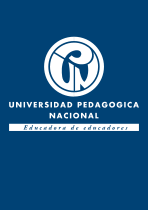La segmentación territorial de la educación general básica y el pueblo indígena kichwa kisapincha de Ambato, Tungurahua en Ecuador.

Citación
Fecha
2020-08-31Autor
Pinos Montenegro, Judith
Enlace al recurso
https://revistas.pedagogica.edu.co/index.php/RCE/article/view/10799Palabras claves
Educación básica
Política pública
Población indígena
Acceso a la educación
Pertinencia cultural
Metadatos
Mostrar el registro completo del ítemResumen
El presente artículo es el resultado final de una investigación de campo con enfoque participativo. Tiene por objetivo identificar y describir las ideas sobre la segmentación de los servicios educativos que manifiestan agentes indígenas. Teóricamente, este trabajo usa los pensamientos de Weber, Bourdieu, Ringer y Archer, que se enfocaron en la capacidad de agencia de quienes confluyen en un contexto social. Metodológi-camente es una investigación cualitativa de tipo exploratorio y un estudio de caso. La indagación se realizó durante los años 2017 a 2019. Los hallazgos principales mues-tran que en el 2017 la segmentación territorial de los servicios escolares fue percibida como una arbitrariedad del Estado, que incumplió con el mandato constitucional de consulta previa y afectó el acceso a la educación. Sin embargo, hoy la política pública es parcialmente aceptada y lo que se cuestiona es la poca pertinencia cultural de los servicios educativos.
Abstract
The article is the result of a field research with a participatory approach. This aims to identify and describe the ideas that native’s agents manifest about the seg-mentation of educational services. Theoretically, this work uses the thoughts of Weber, Bourdieu, Ringer and Archer, who focused on the agency of those who come together in a social context. Methodologically, it is a qualitative, exploratory case study. The research was conducted from 2017 to 2019. The main findings of this work show that, in 2017, the territorial segmentation of school services was perceived as an arbitrary decision of the State, which did not meet the constitutional mandate of prior consultation, and affected access to education. Even though today public policy is partly accepted, people question the lack of cultural relevance of educational services.
Editorial
Editorial Universidad Pedagógica Nacional
